Business Energy Bills: A Practical Guide for Startups and Small Businesses
When you’re setting up a new business, there’s a lot to learn, and utility bills are rarely top of the list. But if you don’t understand what you’re being charged for, it’s easy to overpay.
This guide breaks down the typical business energy bill, explains what affects the cost, and shows how to avoid common pitfalls, especially if you're a sole trader, startup, or small business.

What Is a Business Utility Bill?
A business utility bill is a summary of what your company owes for essential services like electricity, gas, water, broadband, and waste. For most small businesses, electricity and gas are the largest recurring costs, especially if you rely on lighting, heating, refrigeration, or equipment during long hours.
Here’s why business energy bills are different from domestic ones:
-
No price cap: Unlike households, businesses aren't protected by Ofgem's price cap, so rates vary significantly.
-
Higher VAT: You’ll usually pay 20% VAT on energy unless you qualify for the reduced 5% rate (for low usage or mixed-use premises).
-
Extra charges: Most bills include additional costs like the Climate Change Levy (CCL), metering fees, or contract-related surcharges.
If your business is based at home or uses very little energy, you might be eligible for exemptions or a different tariff. Always check your eligibility.
Energy Bill Breakdown: What Each Section Means
Every supplier has their own layout, but most business energy bills follow a similar structure. Here's how to read your bill and what to look out for:
Billing Period and Account Summary
- Billing dates - The period your energy usage covers
- Account reference - Your unique customer number, often needed if you switch
- Site address - The property being billed (double-check this if you have multiple sites)
- Total balance - What you owe this billing period
Meter Readings and Energy Usage
- Measured in kilowatt hours (kWh)
- Readings may be actual or estimated - Actual readings are more accurate; estimated readings are marked with ‘E’ or ‘ESTIMATED’
- Multiple meters - Some sites have day/night meters or different registers for peak and off-peak
- Usage split - Check if usage is split by time of day or by register, especially if you're on a multi-rate tariff


Unit Rate and Standing Charge
- kWh used - Your actual consumption
- Unit rate - What you pay per kWh (e.g. 14.82p)
- Standing charge - A flat daily fee for being connected, even if you use no energy (e.g. 24.24p per day)
- Rates set by your contract - If your rate looks off, compare it to your contract or get in touch
Example
If you used 246.1 kWh in a 31-day month and your rate is 14.82p per kWh with a 24.24p daily standing charge:
- Unit rate cost = 246.1 × 14.82p = £36.47
- Standing charge = 31 × 24.24p = £7.51
- Total = £43.98 (excluding VAT)
Additional Charges
- VAT - Usually 20%, unless you qualify for 5%
- Climate Change Levy (CCL) - Charged per kWh unless exempt (check eligibility)
- Other charges - Some bills include metering fees, admin charges, or late payment penalties
What Drives Up a Business Energy Bill?
Even a small site can mount up a big bill. Here’s what makes a difference:
Tariff Type
- Fixed-rate tariffs offer price certainty for one to three years
- Variable or out-of-contract tariffs can be unpredictable and costly
Standing Charges
- These daily fees add up, even if your usage is low
- High standing charges affect startups or home-based businesses the most
Actual Usage
- Obvious, but worth saying. The more energy you use, the more you pay
- Watch out for hidden drains like always-on equipment or inefficient lighting
Billing Accuracy
- Suppliers often rely on estimated readings
- If you don’t submit readings or have an HH meter, you could be overcharged
Common Energy Bill Charges and Fees
Some charges aren’t obvious until you dig into the small print. Here’s what else might show up:
- Early termination fees - For leaving a contract before it ends
- Deemed rates - High prices if you move into premises without arranging a contract
- Back billing - Suppliers can charge for usage up to 12 months ago if they missed it
- Late payment fees - Often £20 or more on top of your bill
- Capacity charges - Applied if your site has a high agreed-upon usage threshold (uncommon for small firms)
How to Save Money on Your Business Energy Bill
Cutting costs doesn’t need to mean switching off the lights at set times during the day. Start with a few simple steps.
Check Your Current Contract
- When does it end?
- Are you on a fixed rate or variable deal?
- Is the tariff still competitive?
Submit Regular Meter Readings
- Keeps your bill accurate
- Avoids overpaying on estimates
Switch Before Your Contract Ends
- Rolling onto an out-of-contract rate can double your unit rate
- Most suppliers require 30 to 90 days’ notice before switching
Be Smart With Usage
- Fit LED bulbs, add timers or motion sensors
- Turn off the equipment outside working hours
- Install a smart meter to track usage in real time
Are you a low-usage business? You may benefit from a tariff with no standing charge. It's worth comparing options using our comparison engine.
Disputing a Business Energy Bill: What to Do
If your bill looks off, don’t ignore it. Act quickly.
- Check meter readings - Are they actual or estimated?
- Match your tariff - Does the rate on your bill match the rate in your contract?
- Raise it with your supplier - Most have a formal complaints process.
- Still unresolved? Contact us, and we will reach out to your supplier.
Switching Business Energy Suppliers
Switching can make a big difference, but miss your window and you could be stuck. Here’s how to avoid this from happening:
- Find out your contract end date and notice period.
- Give written notice if required. This varies by supplier.
- Don’t wait until the last day. Some suppliers automatically renew contracts.
- Use our energy comparison tool to find and secure the best deal.
We handle the paperwork and supplier contact, allowing you to stay focused on running your business.
Cut Your Energy Bill with BusinessEnergy.com
Understanding your bill is the first step. Finding a better deal is the next step.
Whether you’re just starting out or scaling fast, we’ll compare the market and match you with the right tariff. No hassle. No hidden fees.
Business Energy Bills FAQs
-
What is a utility bill for a business?
A utility bill shows how much your business owes for essential services, including gas, electricity, water, broadband, and waste. Energy is usually the biggest part of this.
-
Is business energy more expensive than domestic?
Yes. Businesses don’t benefit from a price cap and usually pay higher VAT and additional levies.
-
How often do businesses get energy bills?
This depends on your supplier, contract, and metering type. You might be billed monthly or quarterly. Half-hourly meters tend to get monthly bills.
-
Can you get help with business energy costs?
Sometimes. There are government schemes for energy efficiency upgrades and reliefs for small or low-usage businesses. We can advise if you're eligible.
-
What if you work from home?
You might be classed as a domestic customer, or you may still need a business tariff; it depends on your setup and energy usage.
Our Business Energy Suppliers






